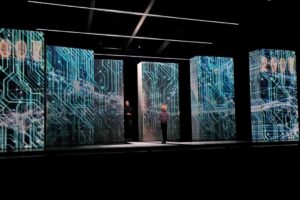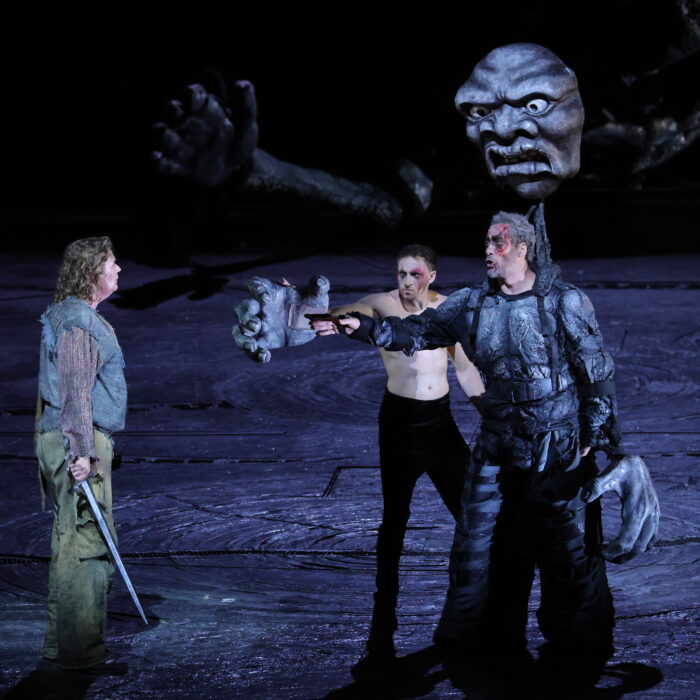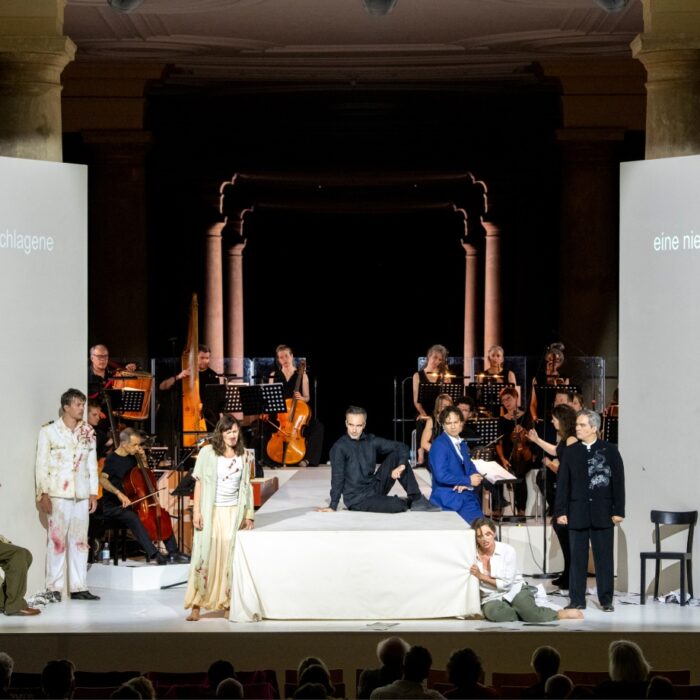
San Francisco Opera 2023-24 Review: ‘The (R)evolution of Steve Jobs’
By Lois SilversteinSteve Jobs forever changed the world of communications. The opera, “The (R)evolution of Steve Jobs,” composed by Mason Bates with libretto by Mark Campbell, opened at the San Francisco War Memorial Opera House and brought the story of how Jobs gave birth to the computer with panache.
Although the opera’s premiere occurred in Santa Fe in 2017, and was the most popular new opera in Santa Fe Opera’s history, this was the Bay Area’s first view of it. “The (R)evolution of Steve Jobs” is a testament to Jobs as a California native and cultural icon. It also shows how opera is a smart forum for exploration. However, navigating a deep dive into who Steve Jobs was while fully-satisfying one’s consciousness with technology’s evolving revolution, it did not.
Who Was Steve Jobs?
Like Gutenberg, Steve Jobs changed the world of personal and public expression. The degree of his impact was profound. To go and sit in an opera house and surrender to an aesthetic experience of the streets of San Francisco during the Folsom Street Fair, a significant expression of the city’s rainbow diversity and on the eve of the highest holy day in the Jewish world, audience members watched some of this story unfold, the story of a visionary who, like a comet, sent the world on a new course. In the opera, Steve Jobs is portrayed as an ordinary man using extraordinary creativity that invented new ways to master use ideas, imagined vistas and understand alternate ways to live. The opera was set at the time when he himself confronted his own mortality while examining events that shaped his personal and professional life.
Composer Mason Bates was drawn to Steve Jobs as the subject for an opera because opera “can illuminate the interior thoughts of different characters simultaneously through the juxtaposition of individual themes. That makes it an ideal medium to explore a man who revolutionized how we communicate.” Librettist Mark Campbell said, “Learning that Jobs was a Buddhist his entire adult life lead me to the ‘ensō,’ the circle that is drawn in Japanese calligraphy to express enlightenment. I connected that with Jobs’ habit of taking long walks and the Zen practice of walking in a circular pattern called ‘kinhin’. He saw this as a step toward developing a way for Steve Jobs ‘circled back’ on his life. The title actually refers less to the revolution Jobs helped create in technology rather to the self-reflection that propels the story.”
Staging the Machine of Machines
Conductor Michael Christie led the 65 member orchestra, including acoustic guitar and one synthesizer played by composer Mason Bates himself. The music created the perfect texture for storytelling. With ten scenes, plus prologue, no intermission, and in keeping with its subject, the production flashed and clicked through an orchestral score that both stimulated and provoked its subject in multiple ways. The stage’s six panels and lighting were made possible by twelve carpenters plus four members of props and sixteen stagehands. The panels had built-in lights inside and acted as surfaces for front projections. Lighting on stage was composed of thin LED tape and the effects were notably manipulated live.
The singing itself was not what made this opera stirring. It was the close following of Jobs’ life story beginning in his Palo Alto garage, and eventually becoming the voice of the second quarter of the 20th century and the leader of the electronic voice of the 21st century. The outstanding vocal performance was by Sasha Cooke singing Laurene, the wife of Jobs, and who appeared in an early scene to hear the younger Jobs lecture. Cooke sang with body and conviction. She was easy to believe. Her voice convinced with its lustrous sound, its rich and ardent low registers as well as its highs. She was a solid and warm counterpoint to the ever-moving, ever-stimulated Jobs. Her performance resonated with what remained of humanity in the midst of the frenzy of electronic life.
Baritone John Moore performed the role of Steve Jobs. He looked the part, wearing Jobs’ characteristic black turtleneck and jeans. He had the characteristic spectacles and moved with quick, electric steps, deftly switching gears in the way he did,, apparently, in mind. Moore conveyed the drama Jobs was going through, and he did much to “take us through some of its stimulating challenges. Often it was hard to hear him over the orchestra. Sometimes it was easier to follow by reading the supertitles.
Soprano Olivia Smith as Chrisann Brennan, the girlfriend and mother of Jobs’ first child, gave a fine performance. Her rich soprano lured and attracted Jobs’ character and the audience as well. Her sound was new to the music’s vocal range up until this point. As was her message: “pay attention to her,” “listen to her,” “care for her and their child.” But, it went nowhere. Her message showed the wall that Jobs had built around himself as he pursued his vision of the “one device.” The machine of his dreams was the machine of machines. The fall-out was painful and her singing, as plangent and appealing as it was, rankled him, as did her presence.
While Brennan’s message conveyed her disappointment, and ours, it aptly reflected the critique so many women have voiced throughout the 20th and 21st centuries about men glued to their work, including their accomplishments, their identities, and their devices. This undoubtedly continues to contribute to the disappointments in relationships. If nothing else, the opera portrayed men in society achieving as per society’s demands and being “punished” and “guilty” for failing to become equal partners to their companions and their feelings. Despite his particular achievement, Jobs, the character, was also “guilty” of failing his partner – and their daughter. The scenic backdrop to one of their initial encounters was an Apple orchard. Was this what gave rise to the name of Jobs’caompany and the great machine itself? Perhaps. Too bad it couldn’t have done more to help keep the relationship from going sour.
More Cast Highlights
Tenor Bille Bruley as Steve Wozniak shone in both his dramatization of his partnership with Jobs – geek, technical genius, lighthearted lively friend, and playful – but also in his voice. Bruley was lyrically satisfying. He could be heard through the orchestra. Their gamboling telephone pranks of using the computer to call the Pope, for instance, was a delightful bit of fun in the midst of the high-seriousness of their pursuit. It reminded us that high-minded works of expression are fed by play. Plaintively, Wozniak sings of “our machine, our beautiful machine” that has become a controller. This was poignant and all too true.
Baritone Joseph Lattanzi as Jobs’ father performed with conviction. Tenor Wei Wu as Kobun Chino Otogawa gave a welcome of relief to the frantic and driving thrust of the overall production. The depths that he reached with his low voice, however, disappeared the clarity of his words. His wit showed the counterpart to Jobs’ frenzy and conveyed so much of what gave Jobs’ ground as he dealt with the power of his mental pursuits. The moment when Jobs lay his head on Kobun’s shoulder showed not only his own humility, but his reverence to humanity. Also, a note about the costume: Was it necessary to include the “rakasu,” the blue handsewn bib that is a significant part of Zen practice, on stage? This literal presentation was distracting. A monk’s robe would have been sufficient.
(R)evolutionary Insight & Inspiration
The admixture of the story of how creation might occur and the combination of the joys and sorrows of its genesis and fruition created a lively journey through the process and biography of the man who made groundbreaking change. This was certainly the inspiration for all to do something beyond even Steve Jobs’ wildest dreams.
Hurrah for the production. Hurrah for its creation. Hurrah for Jobs and Wozniak for their monumental and world-changing creation. Humanity is the better for it, or perhaps a little worse. We sit on the cusp of wrecking our own human dimension and possibilities by going at the speed of light. We are endangered, but not destroyed if we do not surrender to its power. Technology needs boundaries and “The (R)evolution of Steve Jobs” emphasizes this point: Technology is powerful and cunning. Hold it in your hand, but don’t trade your hand for it.


